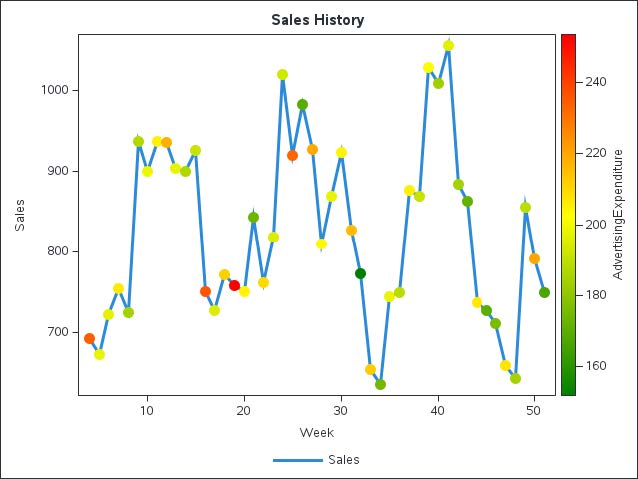A while back The Wall Street Journal published the article “Corporate Economists Are Hot Again“ that chronicles the resurgence of in-house economists in corporate America. The role of a corporate economist may bring about visuals of classic economist stereotypes (watch Ben Stein play to this stereotype as a teacher in the great 1986 movie Ferris Bueller's Day Off - search for "anyone, anyone" and the movie title for a good laugh). These types of prognosticators were popular in the 1970’s and 1980’s as companies attempted to turn the volatile macroeconomic environment into a competitive advantage. The subsequent near-twenty-year economic expansion and decreasingly volatile economy reduced the need for full-time economists, since the future continued to appear near-certain. Recently, economists are being hired again, but this time it is for a completely different reason, one that I have been evangelizing since my start at SAS. Economists are great source for analytical talent. They have all the necessary skills, which is why many companies are hiring them into these roles. Economists are poised to break in to data science roles for these five reasons:
- We understand objective functions: Economists love objective functions, since they dictate how the players in a system behave. This can be important in both predicting outcomes as well as in conducting analysis. If the objective is to understand how price affects quantity, variable selection mechanisms cannot be used because they would eliminate the price variable.
- Economists have a very strong linear regression toolkit: While economists often do not have the depth of statistical methods that a formally-trained statistician has (we miss out on clustering and variable reduction, to name a few), we know what we know with great depth. And fortunately, very few problems require more than linear regression. There is one subtle tweak to an economist’s regression toolkit, which is….
- We own observational data and causality: Economists never assume we have the luxury of experimental data. We always assume that the data are rife with issues such as measurement error, censoring and sample selection. For these reasons, economists have tweaked their regression training to address all these problems. Nearly all the corporate customers of SAS I have met model data generated outside a lab. The data are collected retroactively and have all the problems listed above and more.
- Articulating the problem and the solution: This reason is closely tied to the first point. Economists can talk about the problem and explain the solution. I have heard my fellow economists call this trait “storytelling (hat tip to John Moreau).” I think term that perfectly describes our skills here. SAS customers often tell me that they like the way economists conduct regression, because they look at the coefficients to verify they align with theory. Part of the storytelling proficiency is skill at explaining what incentives led to this response. Other disciplines tend to focus on statistical fit rather than explanation.
- We work with big data: While this might not be immediately obvious, economists are very skilled with dealing with data that are uncomfortably large. Nearly every labor or health economics course requires a data replication project involving multiple years of the US Census Bureau’s Current Population Survey or their 5-percent Public Use Microdata Sample (PUMS). These datasets easily are multiple gigabytes in size and require programming efficiency to process.
In fact, perhaps one of the most famous advocates of the “economist as data scientist” argument is Hal Varian. While his comment about statisticians being sexy is far better known, he is an economist himself, and the full quote sums it up best:
“I keep saying the sexy job in the next ten years will be statisticians. People think I’m joking, but who would’ve guessed that computer engineers would’ve been the sexy job of the 1990s? The ability to take data—to be able to understand it, to process it, to extract value from it, to visualize it, to communicate it—that’s going to be a hugely important skill in the next decades, not only at the professional level but even at the educational level for elementary school kids, for high school kids, for college kids. Because now we really do have essentially free and ubiquitous data. So the complimentary scarce factor is the ability to understand that data and extract value from it.
I think statisticians are part of it, but it’s just a part. You also want to be able to visualize the data, communicate the data, and utilize it effectively. But I do think those skills—of being able to access, understand, and communicate the insights you get from data analysis—are going to be extremely important. Managers need to be able to access and understand the data themselves.” –Hal Varian, Chief Economist, Google[1]
Too bad he didn't call economists sexy.
So what holds economists back? I have my theories. I believe there are three key areas we must address: 1) terminology, 2) methodology and 3) technology. I will elaborate on these during my upcoming talk at the National Association for Business Economics Annual Meeting in Chicago September 27-30. If you find yourself in the area, I hope you can attend.








4 Comments
Good post. I too perceive comparative advantages for economists in the world of data analysis. The 'storytelling' part is particularly interesting. I find myself writing the white papers for one firm I'm working with. In the end it is about communicating the narrative effectively. What is the data telling us definitively? What might it be saying? What do we not know? How does this all fit in the larger story of what your trying to do or learn?
Ken, we ought to talk soon. martin
Hi Martin,
Nice to hear from you. What else could we do as a discipline to get the word out that our skills can fill some of this analytics talent gap?
Also, I think your "what do we not know" point is an interesting one. I do think our brains are conditioned by training to be both inquisitive and almost slightly predictive in the sense that we are somewhat willing to carefully speculate on causality. My impression is that companies tend to like this trait.
Best-Ken
Ken,
Interesting post. You asked Martin above "What else could we do as a discipline to get the word out that our skills can fill some of this analytics talent gap?" I think that Hal, whom I know well and respect a lot, shortchanged economists in the quote above. I agree that statisticians are critical in the new era of big data (whatever that means), but they have a very particular way of viewing the world, similar to machine learning folks: there is a data-generating process, and we need to figure it out. Economists are a bit more weary about that so-called data-generating process. We recognize that the data is a consequence of behavior, and that the behavior depends on incentives, which in turn depend on institutional details and market design elements. So, the need to interpret the data for causal relationships is tricky, and this is where economists, and in particular applied microeconomists, come in very handy. I don't need to go far beyond the work that I have done with my team at ebay, or some of the work that people like Hal himself has been involved in, to see that our skills do indeed fill some of this analytics talent gap in critical ways.
Thanks,
Steve
Thanks for the note Steve. You make an interesting point about applied microeconomists. I wholeheartedly agree with you that the applied micro skill set is tailor-made for causal modeling (I have started calling this 'explanatory modeling' to combat the 'predictive modeling' only message from the pure data mining crowd).
At a recent version of this presentation a student actually posed the question, "what field should I pursue to keep my corporate options open?" I struggled to guide them toward micro or macro. Here is why I struggled. I believe the macroeconomic skill set is immediately associated with a 'forecasting' skill set. This is something that most organizations need and can quickly make the association that the skill sets align. Of course, the odd thing is that most companies don't utilize the type of sophisticated forecasting models that macroeconomists have in their toolkit (exponential smoothing and ARMA models typically suffice).
Then consider the applied microeconomist. The perfect skill set for churn modeling, credit modeling, insurance rate making and a slew of other common tasks. However, I don't think the skill set of an applied microeconomist screams 'predictive modeling' in a way that companies can relate to.
So, long story short, my answer to the student was that micro will probably give you a richer set of useful skills but that macro might be easier to signal your interest in corporate work. Do you agree? Is this something you have passed along to students?